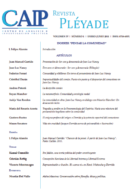
Published 2021-07-13
Keywords
- Ibn Khaldun,
- ‘asabiyya,
- constituent power
How to Cite

This work is licensed under a Creative Commons Attribution-NonCommercial 4.0 International License.
Abstract
This paper aims to show that the core of Ibn Khaldun’s political thought is a theory of constituent power that is expressed in his concept of ‘asabiyya as this decisive potentiality that leads to sovereignty in all human communities. Primarily, it is drawn an historical and intellectual context from which it is proposed a philosophical reading of Ibn Khaldun within the tradition of Arab and Islamic political thought. Secondly, the concept of ‘asabiyya is studied considering its uses from pre-Islamic societies to contemporary Islam, its place in Ibn Khaldun’s work, and the problems of interpretation that were discussed between the scholars on the author, in order to establish the theoretical character of the concept more than the historical and cultural factors that were considered by the sociological reading. Thirdly, and as final reflections, are established some connections between Ibn Khaldun and three contemporary thinkers (Benjamin, Arendt and Foucault) in relation to the problem of ‘asabiyya, violence and power.